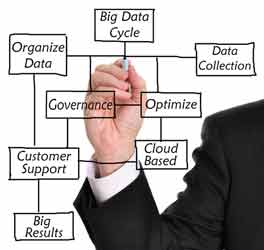Data Scientist Careers
Did you know that every two days the world creates as much information as we did from the beginning of time until 2003? The total amount of data being captured and stored doubles every 1.2 years according to Bernard Marr. By exploring this endless stream of information, companies can understand their audiences and products in completely new ways. Big data is a total game changer.

Instead of measuring data in gigabytes or terabytes, big data is now discussed in petabytes, exabytes, zettabytes, and even yottabytes. There is so much information out there that is captured by social media, websites, retail transactions, GPS, smartphone apps, utility records, even surveillance. The days of hard copies and file cabinets are over, now every bit of information is stored digitally.
Big data is literally growing by the minute. This brings up the big question, what can companies do with all of that data? They can hire a data scientist to study it and extract useful information that can change your life.
The term data scientist was coined in 2008. The Harvard Business Review claimed that data scientists have the sexiest job of the 21st century. CIO.com describes data scientists as a “hybrid hacker, analyst, communicator, and trusted advisor.” That’s a lot of unique jobs rolled into one.
Data scientists need a strong background in computer science, information technology, statistics, analytics, mathematics, coding, programming, and modeling. Combine this vast knowledge with the ability to develop business strategies, build algorithms, understand programming languages like Python, Java, and Ruby, and have working knowledge of software libraries like Apache Hadoop.
To be a successful data scientist, you also need to be able to communicate. Data scientists must take their expertise in a wide variety of fields and then break that complex information into understandable chunks of valuable insights that can change the way a business operates. Ultimately, the goal of a data scientist is to communicate insights to their company to help drive successful marketing campaigns, boost the bottom line, or improve other things.
Big data has so much potential. It’s revolutionary. The curious and inquisitive minds of data scientists spend their time staring at endless supplies of data and extracting useful information out of it. Data scientists literally analyze data, ask “what if” questions, spot trends, find solutions, and make recommendations.
A data scientist’s insights and analysis can help businesses and corporations run smoother, boost profits, improve products, and so much more. Big data has been used to address and predict things like consumer markets, shopping habits, healthcare management, terrorist attacks, cell phone data usage, and many other things. It’s a fascinating niche that will change the way we live our lives.
To become a data scientist, seek a degree in computer science, business, or data science from a top-tier university. Some data scientists are self-taught through free online courses. However you learn, become an expert at mathematics, coding, and communications.
When you’re ready to apply for a data scientist job, you can find work at large companies, government agencies, technology firms, research institutions, and scientific organizations. Data scientists are in high demand, but it’s a very competitive field. It’s hard for employers to find fully qualified, well-rounded data scientists who can combine all of the necessary knowledge and are still able to communicate it.
Data scientists make between $61,000 and $130,000 per year. The average annual salary of a data scientist is $95,000. Big data is expected to create a total of 6 million jobs in the US in the future.
If you have a curious and inquisitive mind, are a math and coding expert, have a strong business sense, and enjoy spotting trends, then find a job as a data scientist. Your insights could unlock the future.
Quick Facts About Data Scientists
Job Title: Data Scientists
Office: Working with Big Data
Description: Study big data and extract useful information
Certifications/Education: University Degree
Necessary Skills: Math, Statistics, Business, Coding, Communications
Potential Employers: Government agencies, technology firms, research institutions, and scientific organizations
Pay: $61,000 and $130,000 per year

